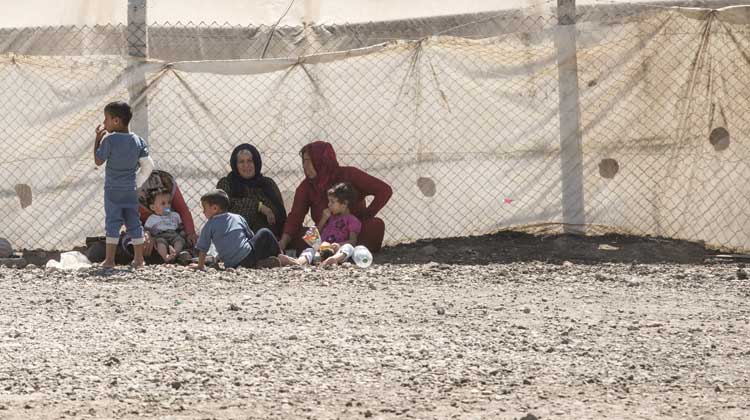
Children are increasingly terror victims on the world stage—not only as targets but also as perpetrators—according to panelists at the Heritage Foundation forum “Islamist Ideology and the Radicalization of Children: What Can be Done?” on June 14.
“‘[R]adicalization of children,’ these are three words that should never go together,” said Emilie Kao, director of the Richard and Helen DeVos Center at the Heritage Foundation. “But in our modern age of terror, we see that groups like Boko Haram, ISIS, and the Taliban are increasingly using children as young as four years old to launch attacks in Syria and Iraq, Nigeria and Indonesia, as well as in Austria, France, and Germany.”
In addition to terror groups abducting and recruiting children worldwide to participate in terror acts—sometimes under threat of rape and torture—Kao noted that they have also enticed parents to offer their children as terror recruits.
The world’s attention turned to Nigeria in 2014 when Boko Haram kidnapped nearly 300 girls from their boarding school, igniting the #bringbackourgirls movement. Today, a majority of Boko Haram’s suicide bombers are female, and one in five are children, Kao said.
“These children should have been like their peers—going to school, playing games, playing sports, and being nurtured and cared for by their families—but instead these terror groups have instrumentalized them, and in some cases their parents have cooperated.” she added.
Deep, long-term impacts await children who return from being trafficked, kidnapped, and coerced by terror groups. Turning the tide for children exposed to such ordeals is a monumental challenge.
“The education system is the only way to get in,” said Tina Ramirez, president and founder of Hardwired Global a nongovernmental organization that works to combat religious oppression.
Teachers in school systems from California to the Middle East see the threat, Ramirez said. In San Diego, a child in a refugee community taunted to another student that he was an ISIS member. In Irbil, the capital of Iraqi Kurdistan, a teacher caught students pretending to behead a fellow classmate on the playground, Ramirez said.
Hardwired Global helps teachers develop curriculum that conforms with local culture and address violent behavior.
The first three countries in which Hardwired Global conducted its programs, children with negative views of women, other ethnic, and religious groups showed considerable progress is harboring more inclusive feelings.
Other panelists stressed the dangers for countries that receive the most refugees and migrants from extremist-held areas. Lebanon has over a million refugees, some who have fled from ISIS-held regions in Syria. For the children who grew up under ISIS, unlearning violence can be difficult, said Robin Simcox, the Margret Thatcher fellow at the Heritage Foundation.
“The precise number of children who could be arriving to Europe from what was formerly ISIS territory is unclear for a number of reasons,” Simcox said, but estimates put the number of children returning to Europe from extremist-held areas in the “mid to high hundreds.”
The ethical conundrum of what to do with radicalized children becomes a legal one, too. Simcox referenced a video of a 13-year-old British ISIS member beheading a captured Kurdish fighter, a crime that in Britain he could be charged with as an adult. But in other countries, different age restrictions and legal codes complicate prosecution, and finding evidence beyond propaganda footage can be difficult.
Simcox agreed with Ramirez on the importance of teachers being a frontline for de-radicalization but cautioned that some might see that as teachers spying on students. He said implementing a variety of programs from social work, education, and cross-government coordination would benefit children the most.
“No option is perfect,” he said. “But least desirable is no option.”
Jessica Trisko Darden, a fellow at the American Enterprise Institute researching development, agreed, saying that education is one of the best ways to reach children, but not the only one.
“Radicalization is not a precondition to violent extremism,” she said.
Economic instability, lack of education, and environmental pressures have pushed people into terror groups that they might not necessarily agree with, Darden said. Often, measures such as kidnapping and coercion have forced children into extremism as well.
The developing world—where many children exposed to violent extremism live—has limited resources to implement programs to help them. Often, in places where education is already limited, girls have less access to education than boys. Working only through education leaves girls and women without help.
Family and social groups are two critical networks to target in de-radicalization efforts, since often they are access points to bring people into extremism in the first place, Darden added.
Since social networks and even family members facilitated joining terror networks, children can still be at risk if community-wide solutions are not implemented. When children are at school and isolated from their family, teachers have the best vantage points to identifying risk, Ramirez said.
When asked about how religion plays a role in extremism, panelists pointed out that the vast majority of people of faith are not radicalized, but that faith can play a role in radicalization. All religious communities, from Christianity, Hinduism, and others have faced issues of radicalization, they said.
Jackson Barnett is a staff writer for Homeland411.
© 2018 Homeland411
Click here to subscribe to the Homeland411 electronic newsletter.